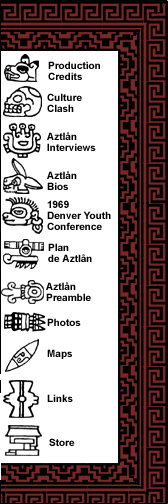

Q: Given that Aztlán may be, as you say,
a spiritual concept rather than a geographical one, is it still important
to try to document the existence of Aztlán? And if so, how might
that be important to Chicano activists?
A: It is very important to have documents. That is the aim [of all historians].
The more documents we have, the better.
Now, these documents help the activist because they have to prove that
what they say is fact, that they are not just demagogues. [We always hear]:
"Where are your documents? Can you prove it?" That's why I think
this is very important. The more documents we have, the better it is to
establish this history, especially the written history. Because the oral
history is something else. The oral history is very important, but it
is difficult to document, and that's what the Chicano scholars have been
doing for the last thirty years. Thirty years ago you didn't have a single
document written by a Chicano about our own history. It has been the work
of the Chicano scholars that has recovered this history. [Our history]
has been completely ignored [by the] majority [of] historians, because
they consider it [not] worth studying. They say [we didn't] have any history,
[we didn't] have any literature, [we didn't] have any arts. But the [Chicano]
scholars, in the last thirty years, have documented these [things], and
more documents are being discovered. That is why it is so important to
have these maps, these texts, and so forth, in hand, to prove that we
have had a history.
Q: As you said before, the concept of Aztlán was formed in the
'60's, and once that happened, it unified Chicanos. In what ways has the
concept of Aztlán motivated Chicanos in the struggle?
A: The concept of Aztlán has several meanings. One of them is finding
our roots, especially [our] indigenous roots that have been forgotten.
Now, once this concept was established and accepted, it has given Chicano
scholars and activists and others a concept, a sense of a homeland. A
sense that they are a people that have something in common, a common identity.
They are not just [members of] regional groups. [This gave us] a unified
vision. I've just now written a manuscript called La Posia Angelina that
is going to document the history of [over two hundred Chicano] poets,
in one city only, that up till now have been forgotten. And the same thing
has been done by scholars in history and in folklore. So that's why it
is so important to have an overall concept uniting all Chicanos, whether
it is in the Southwest or elsewhere.
Q: In recent years, some people say to us "Why don’t you go
back to Mexico?" Does the concept of Aztlán turn that argument
around? Doesn’t it say we are where we came from?
A: [That idea of "go back where you came from"] was used before
to all ethnic groups: Italians were told to go back to Italy; Germans
go back to Germany. But in the case of the Chicano, you cannot say that.
You can tell a Frenchman "go back to France" if you want to,
but you cannot tell a Chicano "go back to Mexico" because he
has never been in Mexico. He [and his ancestors] were born here. This
is his home.
So how [the idea of Aztlán] helps, well, with the maps, it shows
that [we] were here before 1848. [We] were here before Texas became independent.
[We] were here before 1821. When Mexico became independent. And [we] were
here even before the Spaniards came. The natives were here, in the Southwest,
even before Columbus discovered America. So why should they go back to
[what is] a foreign country to them? Of course, if you were born in Mexico,
and they tell you "go back to Mexico," well, why don't they
go back to where their ancestors came [from]? I think that would be the
answer. Most Americans came from somewhere else.
<< BACK